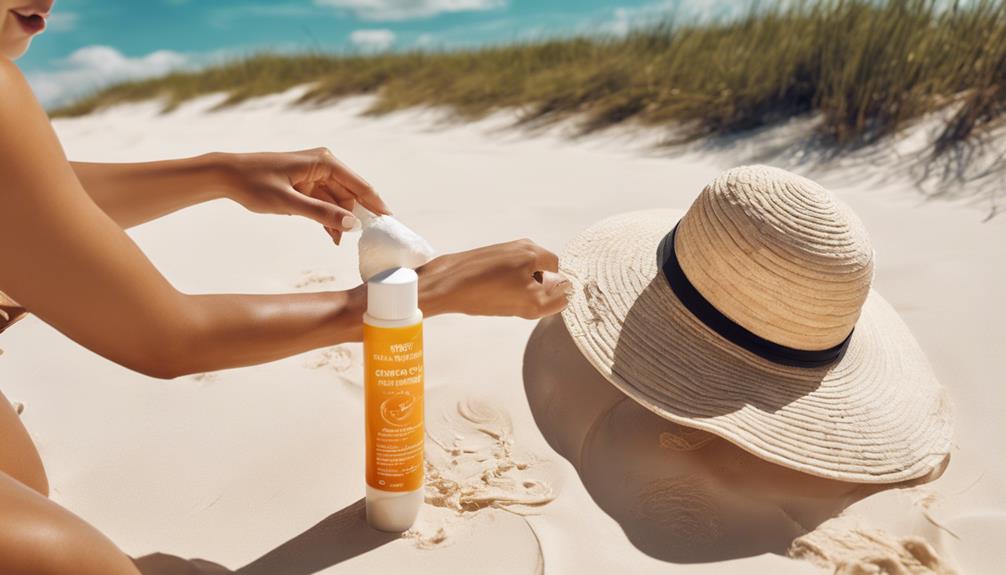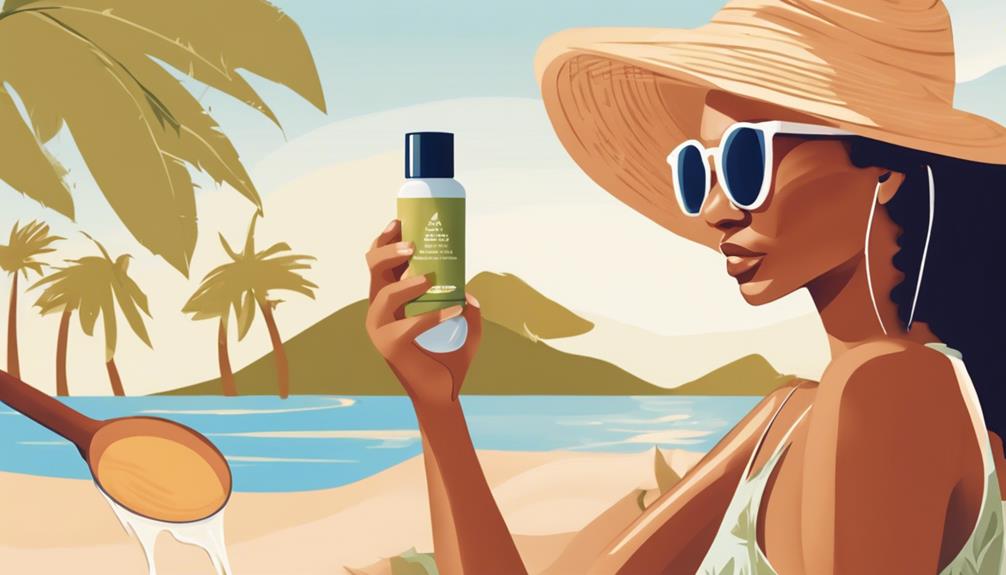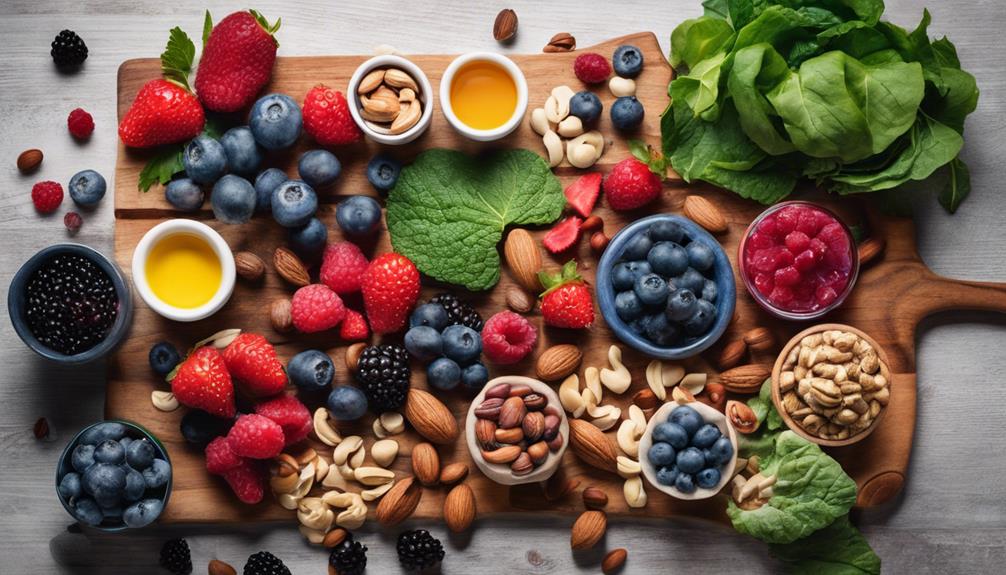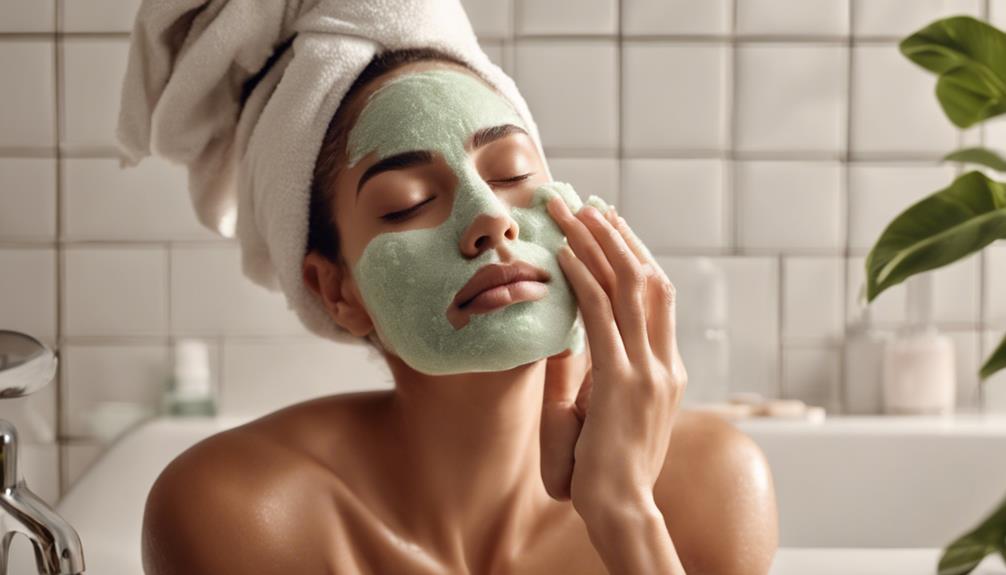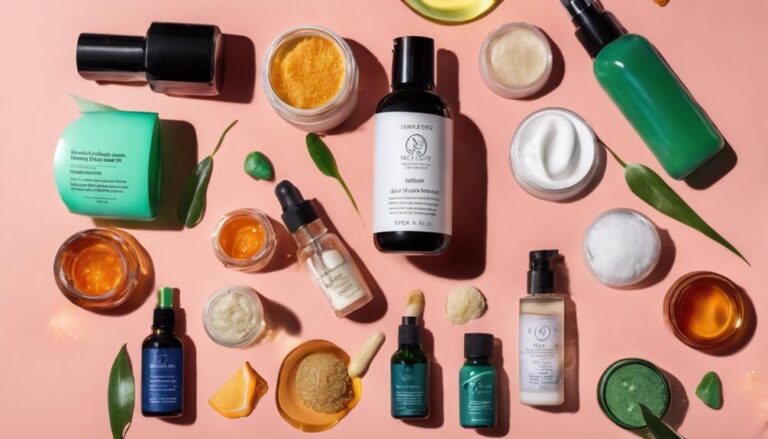How to Protect Your Skin Naturally
When it comes to protecting your skin naturally, the key lies in finding a balance between simplicity and effectiveness. You might be surprised to discover that some of the most potent skin protectors are already in your pantry or fridge, waiting to be incorporated into your daily routine. By making small yet intentional changes, you can create a shield that not only safeguards your skin but also enhances its natural radiance.
Key Takeaways
- Use mineral-based sunscreens for natural UV protection.
- Stay hydrated with natural moisturizers like aloe vera.
- Consume an antioxidant-rich diet for skin health.
- Opt for gentle, organic skincare products.
- Practice stress management for skin wellness.
Importance of Sun Protection
Understanding the importance of sun protection is crucial for maintaining healthy skin. UV radiation risks aren't to be taken lightly, as prolonged exposure can lead to various skin issues, including skin cancer. Protecting your skin from the sun's harmful rays is essential for skin cancer prevention. Even on cloudy days, UV radiation can penetrate through the clouds and affect your skin. This is why incorporating sun protection into your daily routine is imperative.
To shield your skin effectively, always use a broad-spectrum sunscreen with at least SPF 30, reapplying every two hours, especially if you're outdoors.
Wearing protective clothing, such as hats and sunglasses, can provide an extra layer of defense against UV radiation. Seek shade during peak sun hours, typically between 10 a.m. and 4 p.m., when the sun's rays are strongest. By taking these precautions, you're investing in the long-term health and well-being of your skin.
Hydrate Your Skin
To maintain healthy and radiant skin, hydrating your skin is an essential step. Natural moisturizers play a vital role in keeping your skin hydrated and glowing. Ingredients like aloe vera, coconut oil, and shea butter are fantastic options for moisturizing your skin without harsh chemicals. They help lock in moisture, prevent dryness, and promote a supple complexion.
DIY face masks are another excellent way to hydrate your skin naturally. Ingredients like honey, yogurt, and avocado aren't only nourishing but also hydrating. These masks can be customized to suit different skin types and concerns, providing a personalized skincare experience.
For example, a honey and oatmeal mask can soothe and hydrate dry skin, while a yogurt and cucumber mask can refresh and hydrate combination skin.
Incorporating natural moisturizers and DIY face masks into your skincare routine can help keep your skin hydrated, healthy, and glowing from the inside out. Remember, hydration is key to achieving that coveted luminous complexion.
Eat Antioxidant-Rich Foods
Research shows that incorporating antioxidant-rich foods into your diet can have a significant impact on your skin health. A skin-friendly diet packed with antioxidants can help combat the effects of free radicals, which contribute to premature aging and skin damage. Antioxidants work by neutralizing these harmful molecules, protecting your skin from oxidative stress and inflammation.
Including foods like berries, leafy greens, nuts, seeds, and colorful fruits in your daily meals can provide you with a wide range of antioxidant benefits. These nutrients help maintain skin elasticity, promote collagen production, and enhance overall skin tone and texture.
Vitamins C and E, as well as beta-carotene, are powerful antioxidants commonly found in foods like citrus fruits, almonds, and carrots.
Use Natural Sunscreen
In your quest to safeguard your skin naturally, another vital aspect to consider is the use of natural sunscreen. Mineral protection is a key factor when choosing a natural sunscreen. Look for zinc oxide or titanium dioxide in the ingredient list, as these minerals provide effective broad-spectrum protection against UVA and UVB rays without harmful chemicals.
DIY sunscreen is also an option for those who prefer a hands-on approach. You can create your own sunscreen using natural ingredients like coconut oil, shea butter, and essential oils. However, it's crucial to remember that homemade sunscreens may not have a tested SPF value, so reapplication is essential, especially after swimming or sweating.
While natural sunscreens offer protection, it's important to apply them generously and frequently for optimal defense against sun damage. By incorporating mineral protection and exploring DIY sunscreen options, you can enjoy the sun safely while keeping your skin healthy.
Gentle Cleansing Routine
Regularly cleansing your skin is a fundamental step in maintaining its health and vitality. A gentle cleansing routine is especially crucial for those with sensitive skin, as harsh chemicals can aggravate it. Opt for organic skincare products that contain natural moisturizers to soothe and nourish your skin. When cleansing, consider incorporating gentle exfoliation to remove dead skin cells and reveal a fresh layer of skin. Here's a simple yet effective routine to pamper your skin naturally:
| Step | Product |
|---|---|
| 1. Cleanse | Organic Cleansing Milk |
| 2. Exfoliate | Gentle Exfoliating Scrub |
| 3. Moisturize | Natural Moisturizing Cream |
Incorporate Essential Oils
To further enhance your skincare routine, consider incorporating essential oils for their natural benefits in nourishing and rejuvenating your skin. Essential oils offer aromatherapy benefits that can elevate your skincare experience.
Lavender essential oil, for example, has calming properties that can soothe irritated skin and reduce redness. Tea tree oil is known for its antimicrobial properties, which can help combat acne-causing bacteria. When using essential oils, it's important to dilute them properly with a carrier oil to prevent skin irritation.
You can create your own DIY recipes by blending essential oils with carrier oils like jojoba or coconut oil. For a hydrating facial serum, mix a few drops of rosehip oil with frankincense and geranium essential oils. This combination can help to promote skin regeneration and reduce the appearance of fine lines.
Incorporating essential oils into your skincare routine can provide natural nourishment and support for your skin's health and vitality.
Stay Hydrated
For optimal skin health, maintaining proper hydration levels is crucial. Water intake plays a key role in skin hydration, helping to keep your skin supple, smooth, and radiant. Dehydration can lead to dryness, flakiness, and accelerated aging of the skin. Ensuring you drink an adequate amount of water daily is a simple yet effective way to support your skin's health from within.
| Benefits of Hydration | |
|---|---|
| 1. Improved elasticity | 2. Enhanced complexion |
| 3. Reduced wrinkles | 4. Increased skin firmness |
| 5. Enhanced skin texture |
Limit Hot Showers
Limiting hot showers is a beneficial practice for maintaining healthy skin. While hot showers are soothing, they can strip your skin of its natural oils, leading to dryness and irritation. Instead, consider turning down the temperature and opting for lukewarm water or even finishing your shower with a burst of cold water. This can help preserve your skin's natural oils and prevent excessive drying.
Cold water has benefits for skin health, such as reducing inflammation and tightening pores. Additionally, cooler temperatures can aid in temperature regulation, preventing your skin from becoming overly dry or oily. By limiting hot showers and incorporating cold water into your routine, you can support your skin's overall health and appearance. Remember, moderation is key, so find a balance that works best for your skin type and preferences.
Include Omega-3 Fatty Acids
As you focus on preserving your skin's natural oils and maintaining its health, incorporating omega-3 fatty acids into your diet can play a pivotal role. Omega-3 benefits are widely acknowledged for their positive impact on skin protection. These essential fatty acids help to maintain the skin's natural oil barrier, which is crucial for locking in moisture and keeping irritants out.
By including sources rich in omega-3 such as fatty fish like salmon, chia seeds, flaxseeds, and walnuts in your meals, you can nourish your skin from within and promote a healthy complexion.
Research suggests that omega-3 fatty acids possess anti-inflammatory properties, which can help reduce redness, inflammation, and signs of aging in the skin. These healthy fats also support the skin's structure and flexibility, contributing to a more resilient and youthful appearance.
Get Adequate Sleep
To maintain healthy skin and support its natural rejuvenation process, ensuring you get an adequate amount of sleep is crucial. Quality sleep plays a significant role in skin health, promoting collagen production and enhancing skin's ability to repair and regenerate. Lack of sleep can lead to increased stress hormones, which may result in inflammation, acne breakouts, and premature aging. Here are some key skin benefits of getting sufficient sleep:
| Skin Benefits | Sleep Quality |
|---|---|
| Enhanced Radiance | Deep, Restful Sleep |
| Reduced Wrinkles | Consistent Sleep Schedule |
| Improved Elasticity | Comfortable Sleep Environment |
| Healthy Glow | Minimal Disruptions |
| Youthful Appearance | Calm and Peaceful Mind |
Practice Stress Management
Ensuring your skin's health goes beyond just skincare routines and products. Stress can have a significant impact on your skin, leading to breakouts, dullness, and premature aging. To protect your skin naturally, it's crucial to practice stress management techniques.
Deep breathing exercises can help calm your mind and reduce stress levels, which in turn can benefit your skin. By taking deep, slow breaths, you can lower cortisol levels and improve blood flow to your skin, promoting a healthy complexion.
Another effective stress management technique is mindfulness meditation. This practice involves focusing your mind on the present moment, helping to alleviate anxiety and stress. Research has shown that mindfulness meditation can reduce inflammation in the body, which can benefit your skin's overall health and appearance.
Incorporating these stress management techniques into your daily routine can't only benefit your overall well-being but also contribute to healthier, more radiant skin. Making time for deep breathing and mindfulness meditation can be powerful tools in your skincare arsenal.
Avoid Harsh Chemicals
Opt for skincare products free from harsh chemicals to safeguard your skin's health and appearance. Harsh chemicals in skincare products can strip your skin of its natural oils, leading to irritation, dryness, and even long-term damage. Instead, opt for natural alternatives that are gentle on your skin while still being effective.
Look for products that are free from parabens, sulfates, phthalates, and synthetic fragrances. These chemicals can disrupt your skin's natural balance and may contribute to various skin issues.
By choosing products with natural ingredients like aloe vera, coconut oil, shea butter, and essential oils, you can support your skin's detoxification process and promote a healthier complexion. Regularly detoxifying your skin from harsh chemicals can help reduce inflammation, breakouts, and signs of premature aging.
Frequently Asked Questions
Can I Use Natural Sunscreen on My Face Every Day?
You should use natural sunscreen on your face every day for daily application. It's vital for face care, especially with sun exposure. This routine is crucial for skin protection. Make it a habit!
How Often Should I Exfoliate My Skin Naturally?
For skin renewal, homemade scrubs are excellent. But, remember, exfoliating too frequently can irritate. Opt for once or twice a week to maintain a healthy glow. Over-exfoliation can strip your skin of natural oils.
Are Essential Oils Safe to Use Directly on My Skin?
When using essential oils on your skin, be cautious due to skin sensitivity. Always dilute essential oils properly to prevent irritation or adverse reactions. Conduct a patch test before widespread use to ensure compatibility with your skin.
Can I Combine Different Antioxidant-Rich Foods for Better Skin Protection?
You can enhance skin protection benefits by skillfully blending antioxidant-rich foods. Combining these elements can fortify your skin's defenses naturally. Explore antioxidant combinations to create a shield that nurtures and safeguards your skin.
Is It Necessary to Reapply Natural Sunscreen After Swimming?
After swimming, it is essential to reapply natural sunscreen for continued protection. Sunscreen longevity can be affected by water exposure and sweat. To shield your skin effectively, ensure you reapply, especially if you're in the water.
Conclusion
In conclusion, by incorporating natural sunscreens, hydrating your skin, eating antioxidant-rich foods, and following a gentle skincare routine, you can effectively protect your skin from environmental aggressors. Remember, your skin is a reflection of your overall health, so nourish it with care and attention. Like a shield of armor, these holistic practices will fortify your skin against the elements and leave you glowing with vitality.
